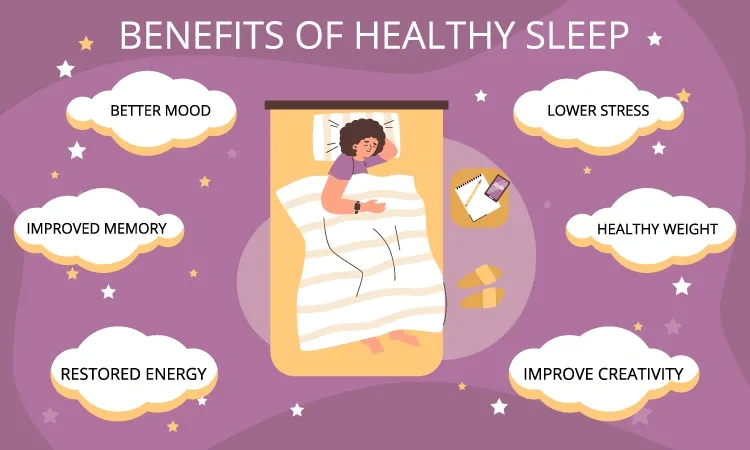Health Benefits of Sleep
Have you been feeling a lot more tired than usual? Been working day and night? Has it been a while since you caught up on some good sleep?
It's about time you do it now! It's time to switch off the snooze button and get a good night's sleep!
What is sleep?
Sleep is a naturally occurring state of body and mind that is characterized by altered consciousness, inhibition of motor (muscle) and sensory activity and reduced interaction with the surrounding.
Why do I need sleep?
Just as your body needs food and water, it needs sleep too.
Sleep plays an important role in repairing and restoring organ systems including immune systems, muscles, and regulation of hormones.
Sleep plays a crucial role in mental health too, facilitating effective consolidation of thoughts and memories and information processing.
Less or poor sleep eventually leads to physical problems like weakened immune system, cardio vascular disorders, and mental problems like anxiety or depression.
How much sleep do I need?
While sleep requirements vary slightly from person to person, most healthy adults require at least about 7-9 hours of undisturbed sleep every night to function their best.
Children and teenagers need a few hours more as they put in more physical and mental activity.
As opposed to the popular belief that sleep reduces with age, research has shown that older people who sleep around 7 hours or more tend to be healthier than others and are at a lower risk to developing lifestyle disorders.
What are the health benefits of sleep?
Sleep plays an important role in almost all aspects of body functioning be it mental or physical –
A good sleep keeps your heart healthy.
- Adequate sleep helps reduce stress. When the body is deprived of sleep, it goes into a state of stress, thereby increasing blood pressure and releasing stress hormones which in turn can increase the risk of heart problems.
- Sleep makes you more alert, as a good night's sleep leaves you refreshed and energized to carry on the day's activities there by promoting good sleep for the next night too.
- A good night's sleep makes you remember and process things better. Research has shown that sleep is essential for a process called memory consolidation. While you are asleep, the brain continues to function making memories and links between all the activities that have taken place.
- Sleep may help you lose weight too. Sleep deprivation impacts balance of hormones that regulate your appetite leading to faulty consumption of food and in turn weight gain. So in case you’re thinking of losing weight, a good night's sleep forms an important part of the process.
- Sleep helps reduce your risk of going into depression. Sleep impacts levels of serotonin, the reduction of which increases the chances of developing depression.
- Sleep is time for relaxation, rejuvenation and repairing. While you are sleeping, your body is hard at work, repairing the damage caused by harmful agents in the environment. It produces certain proteins that form building blocks for cells allowing them to repair and rejuvenate.
- Sleep helps you get smarter. Napping in daytime serves as a stimulant and leaves you fresh for the rest of the day. So the next time you go to get a shot of coffee or tea, try a short nap instead.
What are the ill effects of less sleep?
If you have spent a night tossing and turning before, you already know how you wake up the next day right? Tired, cranky and out of sorts!
But the long term ill effects of sleep deprivation are much more serious than mere grogginess or grumpiness.
Sleep deprivation puts you at a risk of heart diseases, hypertension, diabetes, memory issues, trouble thinking and concentrating, mood swings, low sex drive, weakened immunity, weight gain, imbalance-leading to one being more prone to falls and accidents.
Sleep deprivation can lead to respiratory problems like sleep apnea.
Faulty sleeping habits can lead to sleep disorders like insomnia.
Insomnia is a sleep disorder characterized by difficulty in falling or staying asleep. A person with insomnia wakes up often in middle of sleep and has difficulty going back to sleep. It often arises out of faulty sleep timings, faulty sleeping conditions, mental or physical conditions like depression, stress disorders, diabetes, hypertension or anxieties. It can be treated by behavior therapy, improving sleep habits, and use of sleeping pills too.
Treatment of the underlying cause helps improve sleep conditions in most cases.
Insomnia can be treated effectively with homeopathic medications by treating the underlying causes and improving the overall health of the individual.
And the best part is that it is done without any adverse effects.
While these problems are definitely treatable, why get into them in the first place?




